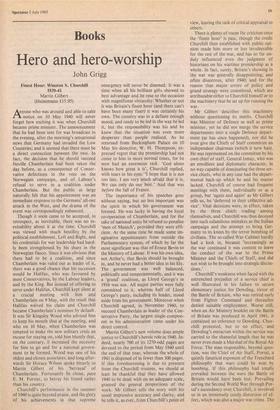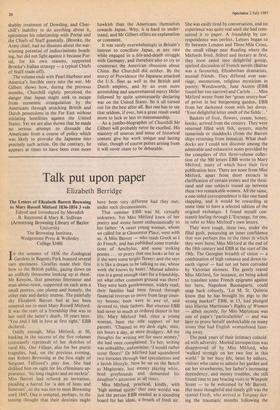Books
Hero and hero-worship
John Grigg
Finest Hour: Winston S. Churchill 1939-41 Martin Gilbert (Heinemann £15.95)
nyone who was around and able to take notice on 10 May 1940 will never forget how exciting it was when Churchill became prime minister. The announcement that he had been sent for was broadcast in the evening, after the morning's sensational news that Germany had invaded the Low Countries; and it seemed that there must be a direct connection between the two. In fact, the decision that he should succeed Neville Chamberlain had been taken the day before, as a consequence of Conser- vative defections in the vote on the Norwegian campaign, and of Labour's refusal to serve in a coalition under Chamberlain. But the public at large naturally felt that his appointment was an immediate response to the Germans' all-out attack in the West, and the drama of the event was correspondingly enhanced.
Though it soon came to be accepted, in retrospect, as inevitable, there was no in evitability about it at the time. Churchill was viewed with much hostility by the political establishment, Left and Right, and his credentials for war leadership had hard- ly been strengthened by his share in the Norwegian fiasco. Since it was obvious that there had to be a coalition, and since Chamberlain was ruled out as leader of it, there was a good chance that his successor would be Halifax, who was favoured by most Conservatives, by the Labour leaders, and by the King. taut instead of offering to serve under Halifax, Churchill kept silent at a crucial meeting with him and Chamberlain on 9 May, with the result that Halifax waived his claim and Churchill became Chamberlain's nominee by default. It was Sir Kingsley Wood who advised him to keep his mouth shut at the meeting, and who on 10 May, when Chamberlain was tempted to make the new military crisis an excuse for staying on, told him bluntly that, on the contrary, it increased the necessity for hint to go and for a national govern- ment to be formed. Wood was one of his oldest and closest associates, and long after- wards Sir Horace Wilson spoke bitterly to Martin Gilbert of his 'betrayal' of Chamberlain. Fortunately he chose, pace E. M. Forster, to betray his friend rather than his country.
Churchill's performance in the summer of 1940 is quite beyond praise, and the glory of his achievements in that supreme
emergency will never be dimmed. It was a time when all his brilliant gifts showed to best advantage and he rose to the occasion with magnificent virtuosity. Whether or not it was Britain's finest hour (and there can't have been many finer) it was certainly his own. The country was in a defiant enough mood, and ready to be led in the way he led it, but the responsibility was his and he knew that the situation was even more desperate than people realised. As he returned from Buckingham Palace on 10 May his detective, W. H. Thompson, ex- pressed regret that the premiership had not come to him in more normal times, for he now had an enormous task. `God alone knows how great it is', Churchill replied, with tears in his eyes. 'I hope that it is not too late. I am very much afraid that it is. We can only do our best.' And that was before the fall of France.
The importance of his speeches goes without saying, but no less important was the spirit in which his government was formed. He was lucky in having the loyal co-operation of Chamberlain, and for the sake of national unity he refused to penalise `men of Munich', provided they were effi- cient. At the same time he made some im- aginative appointments from outside the Parliamentary system, of which by far the most significant was that of Ernest Bevin to the Ministry of Labour. It was his own idea, not Attlee's, that Bevin should be brought in, and he never had a better idea in his life. The government was well balanced, politically and temperamentally, and it was a 'grand' coalition, as Lloyd George's in 1916 was not. All major parties were fully committed to it, whereas half of Lloyd George's party, including its leader, stood aside from his government. Moreover when Churchill agreed, in November 1940, to succeed Chamberlain as leader of the Con- servative Party, the largest single compon- ent in his administration came under his direct control.
Martin Gilbert's new volume does ample justice to Churchill's heroic role in 1940. In- deed, nearly 700 of its 1270-odd pages are devoted to the period from May 1940 until the end of that year, whereas the whole of 1941 is disposed of in fewer than 300 pages. If this foreshortening is due to pressure from the Churchill trustees, we should at least be thankful that they have allowed 1940 to be dealt with on an adequate scale, granted the general proportions of the work. Mr Gilbert tells the story with his usual impressive accuracy and clarity, and he tells it, as ever, front Churchill's point of view, leaving the task of critical appraisal to others.
There is plenty of room for criticism once the 'finest hour' is past, though the credit Churchill then established with public opi- nion made him more or less invulnerable for the rest of the war, and has so far un- duly influenced even the judgment of historians on his wartime premiership as a whole. In fact, surely, Britain's showing in the war was generally disappointing, and often disastrous, after 1940; and for the reason that• major errors of policy and grand strategy were committed, which are attributable either to Churchill himself or to the machinery that he set up for running the war.
Mr Gilbert describes this machinery without questioning its merits. Churchill was Minister of Defence as well as prime minister, yet he did not merge the service departments into a single Defence depart- ment (as has since happened), nor did he even give the Chiefs of Staff committee an independent chairman (which it now has). He was represented on the committee by his own chief of staff, General Ismay, who was an emollient and diplomatic character, in no way capable of dominating the three ser- vice chiefs, who in any case had the depart- mental back-up which he and his master lacked. Churchill of course had frequent meetings with them, individually or as a group, but 'again and again' as Mr Gilbert tells us, he 'deferred to their collective ad- vice'. Vital decisions were, in effect, taken by the three chiefs trading among ,themselves, and Churchill was thus decoyed into such calamitous mistakes as the Italian campaign and the attempt to bring Ger- many to its knees by the terror bombing of civilians. The so-called War Cabinet hardly had a look in, because 'increasingly as the war continued it was content to leave the conduct of the war to the Prime Minister and the Chiefs of Staff, and did not wish to be brought into strategic discus- sions.'
Churchill's weakness when faced with the entrenched prejudice of a service chief is well illustrated in his failure to secure elementary justice for Dowding, victor of the Battle of Britain, who was retired early from Fighter Command and thereafter denied suitable employment. Worse still, when an Air Ministry booklet on the Battle of Britain was produced in April 1941, it contained no reference to Dowding. Chur- chill protested, but to no effect, and Dowding's ostracism within the service was carried to the shameful length that he was never even made a Marshal of the Royal Air Force. The man responsible, beyond ques- tion, was the Chief of Air Staff, Portal, a quietly fanatical exponent of the Trenchard philosophy that wars could be won by bombing. If this philosophy had totally prevailed between the wars the Battle of Britain Would have been lost. Prevailing during the Second World War through Por- tal's ascendancy over Churchill, it involved us in an immensely costly distortion of ef- fort, which was also a major war crime. The shabby treatment of Dowding, and Chur- chill's inability to do anything about it, epitomises his relationship with Portal and the Chiefs of Staff generally. (Brooke, the Army chief, had no illusions about the war- winning potential of indiscriminate bomb- ing, but did not fight against it because Por- tal, for his own reasons, supported Brooke's Italian strategy — a typical Chiefs of Staff trade-off).
The volume ends with Pearl Harbour and America's forcible entry into the war. Mr Gilbert shows how, during the previous months, Churchill rightly perceived the danger that Japan might seek to escape from economic strangulation by the Americans through attacking British and Dutch possessions in the Far East without initiating hostilities against the United States. Yet we are also shown that he made no serious attempt to dissuade the Americans from a course of policy which was likely to provoke the Japanese into precisely such action. On the contrary, he appears at times to have been even more
hawkish than the Americans themselves towards Japan. Why, it is hard to under- stand, and Mr Gilbert offers no explanation or comment.
It was surely overwhelmingly in Britain's interest to conciliate Japan, at any rate while engaged in a life-and-death struggle with Germany, and therefore also to try to counteract the American obsession about China. But Churchill did neither. By the mercy of Providence the Japanese attacked the U.S. fleet as well as the British and Dutch empires, and by an even more astonishing and uncovenanted mercy Hitler followed by quite unnecessarily declaring war on the United States. So it all turned out for the best after all. But one has to say that seldom, if ever, has a great result owed more to luck or less to statesmanship.
As a jumbo-biographer of Churchill Mr Gilbert will probably never be excelled. His mastery of sources and sense of historical context give his work unique and lasting value, though of course points arising from it will never cease to be debatable.







































 Previous page
Previous page